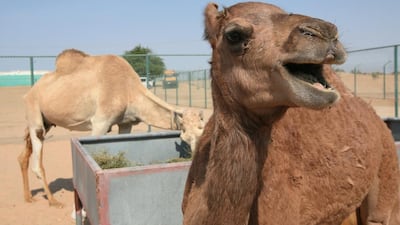DUBAI // Light the candles and break out the cigars. The world’s first cloned camel turns 6 today – and she’s pregnant.
Scientists at the Reproductive Biotechnology Centre in Nad Al Sheba, Dubai, will today mark the birthday of Injaz, who was cloned from ovarian cells in a breakthrough lauded by the world’s scientific community.
They are also eagerly await ing the birth of her calf, which was conceived naturally.
Dr Nisar Wani, scientific director of the centre, said that since Injaz was born many cloned camels had been produced using skin cells, which has made the process easier.
“We are very excited because Injaz is now pregnant and we expect to have a calf from her late this year,” Dr Wani said.
“She has conceived in a natural way. This will prove cloned camels are fertile and can reproduce the same as naturally produced camels.”
The birth of Injaz created great excitement, with the New York scientific journal Biology of Reproduction carrying her picture on its cover.
In 2010 Bin Soughan, the world’s first camel calf cloned from the skin cells of a bull, came into the world.
The Reproductive Biotechnology Centre was established with the support of Sheikh Hamdan bin Mohammed, Crown Prince of Dubai, and has a mandate to use biotechnology for the good of the region’s camels.
newsdesk@thenational.ae

